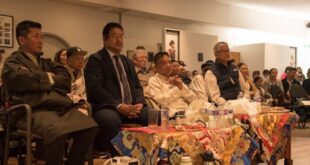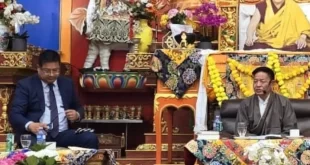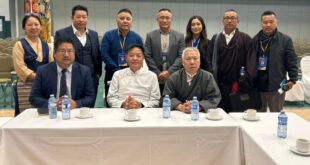San Diego, April 18–On his first day in San Diego on April 18, 2012 morning, His Holiness participated in a panel discussion on climate change in which he reiterated his call for countries to place global interest of environmental concern first before any other national interests. In the afternoon, His Holiness spoke to a packed stadium on the connection between peace, justice and inner development.
His Holiness’ first went to theUniversityofCalifornia San Diegowhere he was received by its Chancellor, Dr. Marye Anne Fox. Accompanied by the Chancellor, His Holiness met with the media.
In his opening statement, His Holiness outlined his two commitments of promoting human values and promoting religious harmony and understanding. Talking about his third commitment concerning Tibet, His Holiness explained that in 2011 there was a change by which he devolved his political authority to an elected Tibetan leadership.
His Holiness said it is his basic belief that the world belongs to humanity and each country belongs to its people, and not to religious leaders kings, queens, emperors or political parties. He said he had said on another occasion thatAmericabelongs to the over 300 million American people and not to the Republican or the Democratic parties.
He said from his days as a teenager, he had voiced his feeling that the governmental system in Tibet had lot of drawbacks. He said he had assumed temporal responsibility in 1950 and in 1952 established a Reforms Committee and started some reform. He, however, added that this was not very successful because China wanted reforms according to its own agenda.
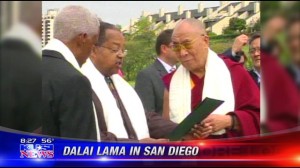
His Holiness said that after 1959 he came toIndiaa free country and was able to work on the democratization of the Tibetan society. He said in 2001 Tibetans began directly electing a leader and he had maintained that he had become semi-retired then. He said he had then expressed his desire to have complete retirement and after seeing the enthusiasm of the Tibetan people during the elections (for the Kalon Tripa, the Chairman of the Tibetan Cabinet) in 2010 he thought it was the right time to devolve all his political authority to the elected leadership. This happened in 2011.
On the issue of promoting inner values, His Holiness pointed to the theme of his visit toSan Diego(that was printed on a banner behind the stage) and said there was the need for people to cultivate compassion without borders. He said compassion with borders was at the biological level and related to one’s concern for one’s family, etc. However, this type of compassion could be taken as the seed and using human intelligence and applying scientific findings people could strive for compassion without borders,
He said one could generate this feeling by having the mindset that just as one wanted happiness and love for oneself others, too, have the same desire. Through this show of concern for the wellbeing of others one can eventually expand to concern for even one’s enemy.
On the commitment to promote religious harmony, His Holiness said this was a level of him being a Buddhist. He said inIndia, beside the homegrown religions many other religious traditions co-exist. Therefore,Indiais a living example of the ability of different religious communities living together with mutual respect and for mutual benefit.
His Holiness said he would remain committed to these two commitments till his death. He explained that the reason why he was expanding on these points was because the media too had a role in promoting awareness of these. People need to realize that the real source of happiness was within them and not depended on power or money. His Holiness said that while the media ought to report on negative developments, they also needed to talk about the above issues, particularly since in a democracy the media had an important role.
When asked for his views on a photo in the LA Times showing American soldiers with dead Afghans, His Holiness reiterated his basic opposition to the use of force saying it cannot be a solution. He then talked about the importance of Ahimsa and non-violence and how non-violence is a realistic approach towards resolution of issues. He said force could have unpredictable outcomes.
When asked about the absence of reports concerning Chinese protest over his visit this time indicated any improvement (in the Tibetan relationship with the Chinese authorities), His Holiness replied in the negative and suggested that the media should conduct deeper investigations on these.
Following this meeting with the press, His Holiness went to the venue of the panel discussion “The Global Impact of Climate Change: Balance Through Universal Responsibility, Compassion and Human Consciousness.”
UCSD Chancellor Marye Anne Fox made a welcome remark in which she expressed her school’s appreciation of His Holiness’ presence. She said he was the first Nobel laureate to be recognized for his concern for the global environment.
His Holiness was introduced by Mr. Pierre Omidyar, founder of eBay, who gave highlights of his life, including some of the international awards bestowed upon him.
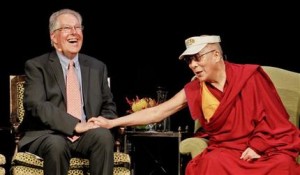
The panel discussion began thereafter. His Holiness’ co-panelists were Prof. Richard C. J. Somerville, Distinguished Professor Emeritus, Scripps Institution of Oceanography, UC San Diego, and Prof. Veerabhadran Ramanathan Distinguished Professor of Atmospheric and Climate Sciences, and Director, Center for Atmospheric Sciences, Scripps Institution of Oceanography, UC San Diego
Prof. Somerville outlined the challenges of reducing the world’s emissions. He referred to His Holiness’ observation that nations were giving priority to their own individual interests than for the global interest on matters of the environment.
Prof. Ramanathan outlined his views on how much of the world’s population were unintentionally contributing to the pollution of the climate through use of wood stoves, etc. He highlighted His Holiness devoting an entire section to environment in his book, Beyond Religion: Ethics for a Whole World, and how compassion without borders was a solution.
In his remarks, His Holiness spoke of his experience at learning about the importance of the environment. He said growing up inTibethe had no idea about environment pollution. He talked about the cleanliness of the Tibetan environment by giving the example of Tibetan travellers having no hesitation in drinking water from the streams when they were thirsty. They had no idea that water can be polluted. After coming toIndia, His Holiness heard from people about how water from a river could not be consumed and that was a bit of surprise to him.
Subsequently, His Holiness said he had contact with scientists and had a special personal interest in the issue of environment. He said this is now the question of the survival of the planet and not just of an individual.
He said so far this blue planet is our only home and we need to take care of it. He said people have immediate reaction when being confronted with photos or news concerning violence, bloodshed, war, starvation, etc. However, the problem of climate change was somewhat invisible and it would be too late if the situation became such that people would have to wear masks in urban areas or be confronted with lung problems, etc. as a result of environmental damage.
His Holiness said there was the need to create awareness over the issue of environment and climate change and that the scientists have a pertinent role in it. His Holiness suggested a worldwide movement like that of the Copenhagen summit on environmental awareness. He added that it was shortsighted of those countries that kept their national interest above that of the global interest concerning the environment. He talked about the situation in Mongolia where the use of coal by families was leading to health dangers. Drawing a connection between economic development and environmental damage, His Holiness said in countries like China and India on account of lack of modern facilities people are resorting to cutting of trees for fuel.
His Holiness said his effort is to draw attention to the fact that the world is interdependent and that each individual’s future is dependent on that of others. Therefore, there was the need for cooperation and the realization of a sense of global responsibility. His Holiness emphasized on the importance of trust in this saying that without trust there cannot be friendship and that without friendship, there will be extreme self-centered attitude. He said people needed to realize that it was in their own interest to take care of others. He said there was the need to generate a feeling of oneness of humanity and have some kind of concern for the wellbeing of the rest of humanity and the rest of sentient beings.
Here His Holiness said his interpreter Thupten Jinpa la reminded him that one of his friends, Prof. Bob Livingston, was from UC San Diego. He said Prof. Livingston was very much concerned about the future of the world and had launched effort for peace and against nuclear weapons.
Thereafter the panel took questions gathered from the public. To a question about changing the mindset of the political leaders on environment, His Holiness said that a drawback of modern education was that it was oriented toward material concerns and did not deal with inner peace. Explaining the historical development that led to a neglect of moral ethics education, His Holiness said there was the need for a well-balanced education that incorporated both material and internal values. He said the media also had a role in this. Through these we can nurture a new generation of future leaders who will have a better appreciation of issues like climate change.
When asked on the best approach when people refused to accept the very existence of environmental problems, His Holiness said that it would depend on the mental attitude one had towards such people. He said when he was confronted with such a situation he would respect their view but at the same time be forthright in arguing his case. He gave the example of Buddhist masters from Nalanda who resorted to frank discussions, including using harsh words, but at the same time having deep respect for those holding opposite views. His Holiness said that we need to realize that there will be difference of views and quoted Prof Bob Livingston as telling him that the six billion people in this world would have six billion views.
His Holiness also said that the Buddha had given contradictory teachings deliberately to complement with the diverse mental dispositions of his disciples. His Holiness said after having done this, the best approach is for people to recall the verse of a Buddhist master who said that if the problem can be resolved there was nothing to worry about and if the problem cannot be resolved there was no use worrying about it.
His Holiness stressed on the importance of research and analysis and the need to look at reality at many levels. He said jokingly that even if one intended to harm someone, it would be more effective if one has done research, knows the reality and has understood the weak spot of one’s target.
He spoke about his respect for science and scientists. He said scientists were open minded and had skepticism. He said skepticism would lead to questions, which will lead to research, which in turn will lead to analysis and the generation of answers.
When asked whether they were optimistic about positive development on the environment front, all the panelists said they were.
Following lunch, His Holiness went to theUniversityofSan Diego to deliver the Joan B. Kroc Distinguished Lecture on Cultivating Peace and Justice. He went on stage of the Jenny Craig Pavilion as Spanish Classical guitarist Pablo Sainz Villegas was performing to the public. The guitarist greeted His Holiness and played a number for His Holiness.
Thereafter, Dr. Mary E. Lyons, President of University of San Diego, spoke about the mission of the school and presented its Medal of Peace saying by working for justice His Holiness is a living witness to the greatest aspirations of the University.
Pam Omidyar, co-founder of Omidyar Network, then introduced His Holiness. Giving His Holiness’ bio, she said his life was dedicated to harmonious living and shared understanding of religious harmony.
His Holiness began his talk by thanking the University for its medal saying he felt very honored to receive it. He said he was just another human being and looked upon the medal as some kind of recognition for his small contribution for serving humanity.
His Holiness said he was encouraged to see that in different countries there was increasing voice about compassion, peace and nonviolence. He said it was not just in words but that people were also making efforts in these fields.
He said the question was to know the real meaning of peace. If peace, he added, was the mere absence of violence, then there could be situations where such kind of peace may prevail, but without any justice. Therefore, he said that genuine peace must come through inner peace and warm-heartedness. His Holiness talked about the demarcation of lines between non-violence and violence action and said action could be physical, verbal and mental. Non-violence is the expression of warm-heartedness and it was only through genuine concern for the well being of others that justice will be served, he said. Any action that is harmful in the long run is unjust, he said.
His Holiness then talked about the two kinds of compassion. He said the biological compassion is something that is present not just in human beings but also among mammals, birds, dogs, cats, etc. He said it occurs in situation where the survival of the youngster is dependent on the sense of care from parents. His Holiness said he wonders whether this sort of compassion is present in turtles as the mother just lays eggs on the shore and do not have any connection with the offspring thereafter. His Holiness said during an earlier visit toHawaiihe had suggested conducting research on this attitude of the turtles by identifying a hatched turtle and pairing it to its mother to see if there was any indication of filial affection. His Holiness felt there might not be because turtles are emotionally not equipped to take care of their offspring.
He said biological compassion is limited and biased. On the other hand compassion without borders was something that could be cultivated through the training of the mind. He said scientifically too brain plasticity shows the possibility of changing the mind. He said there is a connection between the physical health and mental state. A hopeful and fresh mental state is of immense benefit for health, he said. On the contrary, demoralization is bad for health.
His Holiness said he was encouraged that educational institutions were starting to study mind and its impact on the body. He mentioned University of Wisconsin in Madison, Emory University and Stanford University as among those conducting experiments in this field. He suggested that pilot projects could be start to teach children from the Kindergarten level about inner peace as this is the real foundation to build a better 21st century. He said there is connection between a healthy mind and a healthy body.
His Holiness concluded by saying if people found something useful from his speech they could think over them On the other hand, he said if they did not find anything then it does not matter. He joked that in any case he was leaving San Diego the day after tomorrow but that the people’s problem would remain with them. He added that he had great hope from the United States and India. America, he said, is materially well off and is the greatest democratic country. India, he said, is the most populous democracy.
During the Question & Answer session, His Holiness responded to queries about simple ways to cultivate compassion on a daily basis. His Holiness suggested that people could visualize the person most difficult to deal with, get angry with this person, and then begin to analyze. He said one would then get a new realization. For Buddhists, he said, everything is relative and there is no absolute good or bad. When asked why one should feel compassion for those who do not have remorse after committing a crime, His Holiness said that is all the more reason to be compassionate when we look at it from the perspective of the oneness of humanity.
Another questioner wanted to know about His Holiness’ most difficult challenges. He responded by talking about his experience of life under the Chinese. He said at the age of 16 he had lost his freedom and for the next nine years of life under “Chinese Communist brothers and sisters were a little difficult.” He said between 1951 and 1959 life under the Chinese also made him learn to act hypocritically. But in April 1959 after arriving in India he was liberated from the practice of hypocrisy.
He talked about his visit to China in 1954-55 coming back to Tibet more hopeful. He said he had in fact met the Chinese general on his return to Tibet from China and when asked about his impression, he had responded that when he left forChinahe suspicion and fear but that now he did not have them.
However, things became difficult inTibetfrom the end of 1955 to the beginning of 1956 and that he was filled with lot of anxiety and worry. He said in particular being a Tibetan, he understood the plight of his people and wanted to side with their concerns. But at the same time he had no choice but to try to adjust with the Chinese. Ultimately, there was no way but to escape from Tibet, he said.
His Holiness said that onMarch 10, 2008 when he heard of the demonstrations inTibet, he got the same feeling of anxiety and hopelessness that he had onMarch 10, 1959.
He said under such an experience he visualized the Chinese hardliners and practice the “taking and giving” form of visualization. He visualized taking the anger, fear and distrust of the Chinese and giving them in return patience, forgiveness and compassion. He said while this did not necessarily solve the problem it did help him maintain the calmness of his mind.
He then talked about meeting a Tibetan monk who had been in prison for 18 years since 1959. When he subsequently spoke to this monk upon his release and coming over to India His Holiness said he had asked him the most dangerous thing that he had faced while in prison. His Holiness said he thought the monk would rely something like fearing about being killed but the monk replied that he had feared losing his compassion for the Chinese.
When asked what problems should be receiving attention, His Holiness said there were plenty these days. He identified Syria, Afghanistan, Pakistan and the Tibetan issue as some. He, however, said there was good news, too. He talked about the change in the situation inBurmaand said he had learnt today that Aung San Suu Kyi might be able to travel outside Burma. Also, overall humanity was becoming more civilized.
Upon being asked whether he was optimistic or not, he responded that it was far better to remain optimistic. If one is optimistic, he said that one would try to find ways to overcome challenges. On the other hand being pessimistic meant that one feels there is going to be 100 per cent failure and thus not make any effort.
On April 19, 2012 morning, His Holiness will give a public talk on Upholding Universal Ethics and Compassion in Challenging Times at the San Diego State University. In the afternoon, he will participate in a panel discussion on Neuroscience and the Emerging Mind: A Conversation on Human Consciousness and Compassion.


